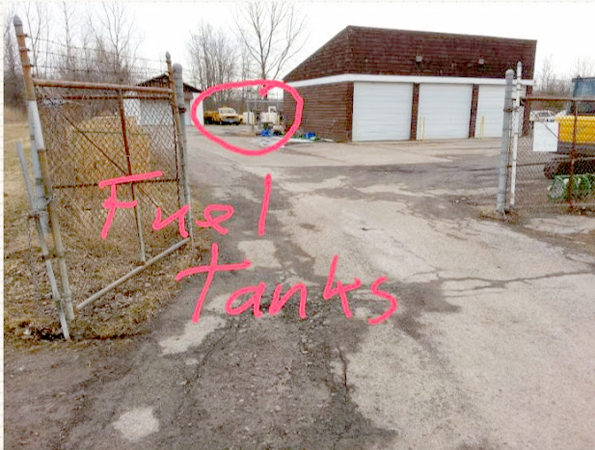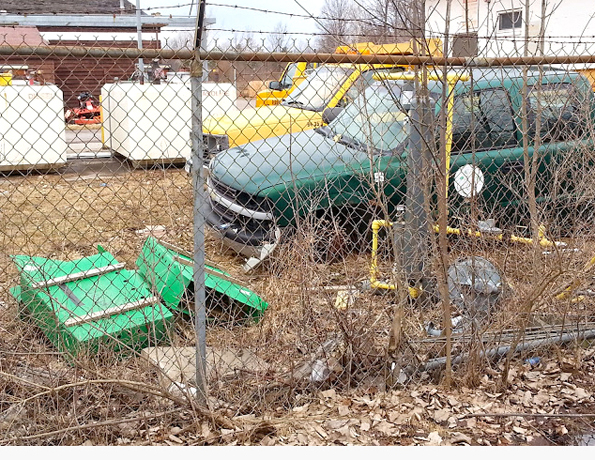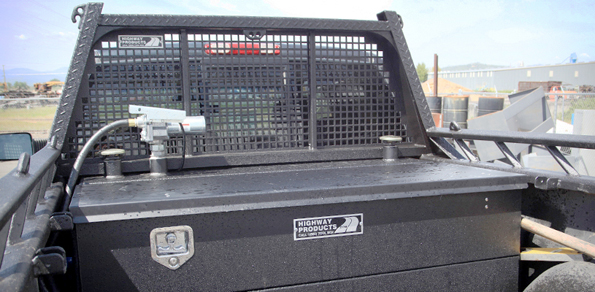
There is a new scandal at the Town of Lewiston.
First there were two Lewiston police officers who stole gasoline from town gas pumps behind the Highway Department garage on Swann St.
Then there was former Town of Lewiston Supervisor Steve Reiter who took town gasoline for his truck, his car, his wife's car, his mother's car, and his lawn mowers.
Now, the Niagara Falls Reporter has learned, Glen Caverly, the town's storm water manager, has been dismissed.
Last Thursday (April 3) night a special executive session of the town board took place at town hall: the topic: How to handle the fact that thousands of gallons of diesel fuel is unaccounted for at Joe Davis Park.
The board decided, in executive session, that, rather than accuse Caverly of stealing, they would eliminate his $43,600 position. Outside of executive session, there was no discussion about fuel.
Councilman William Conrad made a motion to eliminate Caverly's position. It was approved.
When the Reporter asked Councilman Ron Winkley why Caverly's position was eliminated, Winkley said, "It's a personnel matter," adding the town is investigating having someone from the building department handle the part-time duties associated with the storm water manager position.
"It will save money," Winkley said.
Supervisor Dennis Brochey also declined to comment on Caverly but suggested that the termination would save the town, with benefits, as much as $50,000 per year.
While officials are tight lipped, it is clear Caverly's termination related to concerns about whether Caverly had taken diesel from the town for his personal use.
Caverly, 56, who came to Lewiston from Brighton, Mich., was hired as storm water manager, a position required by the state. He was recommended by Reiter and the town board approved his hire by a 4-0 vote on Feb. 28, 2011. The storm water management position is, however, a part-time job, and why he was hired for a full-time position is not clear.
Soon after he was hired, Caverly's job morphed into a full-time handyman position at the various town parks. He worked at Joe Davis Park, hopping on lawnmowers, cutting lawns, filling in abandoned swimming pools, and taking out invasive species for the Audubon Society, installing barricades at Art Park on concert nights, leveling the infield at Washuta Park, grading the ice rink at Academy Park, and building landscape beds at Pletcher Park.
Trouble began about two months ago when it became apparent that diesel fuel was being used at Joseph Davis Park in winter. There are two, 1000-gallon fuel tanks behind the maintenance building, one for gasoline and the other for diesel. Two years ago, the town purchased two large diesel tractors and a John Deere diesel lawnmower for Joe Davis Park. Lawns are cut from May until October.
As readers of the Reporter know, the New York State Comptroller's office has reassigned Amy Doores to investigate the possible misuse of fuel at the town.
Sources say she was curious to know why diesel fuel was being purchased from NOCO Energy Corp. in the winter for Joe Davis Park.
Was it for the snow plows? No. All trucks that operate snowplows in town - and at Joe Davis - are powered by gasoline. Yet from October to late January hundreds of gallons of diesel was used.
Suspicion fell on Reiter. But Reiter's term ended Dec 31, 2013, and diesel was being used after he left office. While anyone can sneak behind the maintenance building at Joe Davis, the fuel pumps were locked. Only one town employee had a key: Caverly.
He was asked to come to town hall to explain to town officials and the comptroller's office how there could be diesel fuel usage in winter.
"I told them what was going on," Caverly told the Reporter. "I explained that Steve Reiter had an arrangement with me to use the fuel for my personal vehicle.
"The state was also questioning us about diesel fuel used in the winter months," Caverly continued. "Well my answer is, duh, we were running a generator (for the ice rink at Academy Park) and that ran on diesel. We had to have diesel fuel. It ran consistently for 60 plus days."
Caverly said he did not keep a record of generator fuel usage but said the ice rink generator could use as much as 400 gallons a day and he delivered some during the wintertime.
Caverly said he used about 25-30 gallons per week for about two years for his truck for town business.
His answers did not apparently satisfy officials.

Within days, a New York State Police investigation commenced to determine whether Caverly had permission, or if he had stolen thousands of gallons of diesel.
Caverly, interviewed by police, said it was common knowledge he was permitted to use town fuel.
"I have an F-350 Ford truck, and they all knew I used it for town work," he said.
Here is what the Reporter has learned.
Any case (if any) against Caverly is circumstantial.
About once a month, Caverly would contact NOCO and order between 300-500 gallons of diesel. He was the only one who had a key to the fuel tanks at Joe Davis. His personal vehicle is powered by diesel fuel. Caverly has an auxiliary tank with a nozzle in the bed of his truck.
At least two witnesses gave depositions to the New York State Police that they saw Caverly pump diesel into his truck and auxiliary tank.
But Caverly denied taking fuel for personal use.
Caverly told the Reporter, when he first came to work, he asked for a town vehicle but Reiter told him to use his own vehicle.
"After I talked to Steve, he had a meeting with the board," Caverly said.
However, if the town board approved Caverly's use of town fuel, there is nothing in any board minutes to prove it.
"I don't know if the board has amnesia or Alzheimer's," Caverly said. "I think they're getting in trouble from the state comptroller's office and they threw me under the bus and opened the state police investigation on me."
Caverly produced a letter signed by Reiter, dated Dec. 31, 2012, on Town of Lewiston letterhead, addressed to Caverly, that reads, "as part of your employment agreement with the town of Lewiston, you will use your own personal vehicle … in the conduct of town business."
The letter does not mention Caverly should access town fuel. Standard practice for municipal employees is, when they are directed to use their own vehicle in the course of town work, they pay for their own fuel, then get reimbursed at a rate of 56 cents per mile.
According to Caverly, he initially procured fuel for his personal truck at the Highway Garage on Swann St.
When Highway Supt. Doug Janese refused to let him continue to get fuel at the highway garage, Caverly said he then ordered fuel from NOCO, had it delivered to Joe Davis, and the bill was sent to the town, where the council approved monthly payments each month for two years.
Caverly installed a lock on the tanks for which he alone had the key and, for two years, fuel usage at Joe Davis was under his control. About $25,000 in diesel fuel was used.
When contacted by the Reporter, and asked if it was true that he had stopped Caverly from using the town pumps at the highway garage, Janese said, "I was never aware of any type of arrangement that was made to provide fuel to Mr. Caverly for use in his personal vehicle. So while I don't specifically remember refusing to let him take diesel fuel, that may well be the case.
"I would not have allowed any employee or any elected official to pump town fuel into his/or personal vehicle without the express approval of the town board, by resolution at an open meeting."
The Reporter then contacted former supervisor Reiter to ask if he gave Caverly permission to get fuel at Joe Davis. Reiter said, "I did not personally make arrangements for Caverly to use diesel fuel at Joe Davis. The highway superintendent would not allow Glen to have any fuel to fuel the truck. It was Mike Johnson (budget officer) who told him to put fuel in at Joe Davis."
The Reporter contacted Johnson to see if he had given Caverly authority.
"Steve definitely gave Glen authority to use his own truck," Johnson said. "He had been using his town truck for town business. But I didn't authorize anybody to do anything. I don't have the authority."
Maybe nobody gave anyone authority, and everyone thought someone else had given authority.
"Was I authorized to use it, or did I steal it?" Caverly said. "They all had knowledge of it for the last two years. They can't say they thought I stole it. They've admitted to knowing it for two years, and nobody wants to step up to the plate and say 'I'm the one who authorized it.' But Steve's specific words were, 'I took it to the board.' He said that two years ago."
The Reporter asked Reiter to explain.
"Yes, Glen and I talked about fuel issues," Reiter said. "Mike Johnson told me about Caverly's fuel usage. Nobody strongly objected to it. I did not stop it, and neither did the town board. So I guess, by not saying 'no,' I authorized it. I think his usage was in the line of duty. But I figured they were keeping track."
They weren't.
What Caverly used for his vehicle is intertwined with fuel used for town equipment. Up to a dozen parks workers took fuel for lawn mowers and other equipment. There was no system in place to record what Caverly used for his personal vehicle.
"I would have set up a log to protect Glen," Johnson said. "All he did was his job. You can't expect him to use his truck and not be reimbursed. But Glen did not write it down, putting him at risk.
"At the highway garage, we have a monitoring system. You put the code key in and it tells the town how much you use. At Joe Davis, there is no device. You have to write it all down."
Caverly said his method of using town fuel represented a "sizeable savings" for the town. He said that if he had charged the town for reimbursements at 56 cents per mile, he would have gotten more than the value of diesel he took from the town.
Caverly said he thinks he drove around 30,000 miles for the town over two years. At 56 cents per mile, he could have charged the town $16,800.
Caverly said his 2008 F-350 diesel pick up gets 12.5 mpg. If he drove 30,000 miles, he would have used 2,400 gallons of diesel. If so, Caverly would have paid $8,928 for fuel at $3.75 per gallon at private pumps. But he would have collected $16,800 in mileage, so he would have been around $7,000 ahead if he charged mileage.
According to Caverly, since the town does not pay tax on diesel, the town did even better.
Diesel costs the town $3.10 per gallon, according to town Supervisor Dennis Brochey. If Caverly used 2400 gallons, it cost the town $7,440 for fuel and the town saved $9,400 by Caverly not billing for mileage.
Not unlike the lack of control over fuel usage, there was another area of conflict.
Caverly supplemented his income by as much as $5,000 per year by renting his personal diesel-burning bulldozer to the town for $250 per day. No one at the town monitored Caverly's usage of the bulldozer, if it was necessary work, or if the number of days Caverly rented the town his bulldozer (while he operated it) coincided with the normal number of days such work would take to accomplish.
It was like a barber deciding if you need a haircut.
What makes it more problematic is that the town possesses two bulldozers similar to the one Caverly owns and, for most jobs, these would have been available to the town at no cost, according to Highway Supt. Janese.
None of this is to suggest Caverly took advantage of this improperly. It is only to suggest that the lack of controls is stunning.
Sources have told the Reporter that the State Police have found no evidence of stealing, and do not plan to charge Caverly. His termination would seem to conclude the matter as far as town and state officials are concerned.
Last week Brochey changed the locks at Joe Davis Park and he said he and the town board will be monitoring fuel usage far more closely going forward.
Stay tuned.

|

